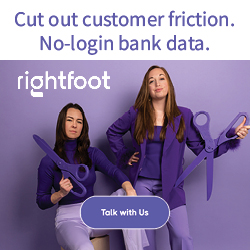NFTs
Forget the Metaverse, I Bought Real Land
February 20, 2024 In 1958, developers purchased 82,000 acres of barren land that was situated a hundred miles north of Los Angeles with a plan to build a sprawling metropolis for 400,000 future residents. As it instantly became the third largest city in California by land area, they chose an appropriately symbolic name, California City. It was a flop from the start. Although powerful marketing led to the sale of 50,000 lots by the early 1970s, the city only had a population of 1,300 people by 1969. That was bad enough that the Federal Trade Commission intervened in 1972 and forced a settlement that allowed thousands of landowners to get refunds. California City held on, however, and it’s now home to nearly 15,000 residents. It even has its own airport. But still, what it has become is still remarkably short of the original vision.
In 1958, developers purchased 82,000 acres of barren land that was situated a hundred miles north of Los Angeles with a plan to build a sprawling metropolis for 400,000 future residents. As it instantly became the third largest city in California by land area, they chose an appropriately symbolic name, California City. It was a flop from the start. Although powerful marketing led to the sale of 50,000 lots by the early 1970s, the city only had a population of 1,300 people by 1969. That was bad enough that the Federal Trade Commission intervened in 1972 and forced a settlement that allowed thousands of landowners to get refunds. California City held on, however, and it’s now home to nearly 15,000 residents. It even has its own airport. But still, what it has become is still remarkably short of the original vision.
All of this history was something I breezed through right before I impulsively clicked a button on my screen asking me to confirm my purchase for a lot there. One click. That’s apparently all it took to become the newest member of a potential future neighborhood in California City, one that might not ever come to fruition. But how I found it in the first place is the real story. It appears that in the modern era this sleepy desert outpost has become a bit of an experimental laboratory for something relatively new in the real estate world, converting properties into NFTs.
 Here’s how it’s done. A landowner places their property into an individual trust and ownership of that trust is governed by whomever owns the corresponding NFT on Ethereum. In effect, the owner of the trust would be defined by their ugly hex address, like this one for example: 0x64233eAa064ef0d54ff1A963933D0D2d46ab5829. It’s actually quite basic and it’s all made possible by a “proptech” company called Fabrica.
Here’s how it’s done. A landowner places their property into an individual trust and ownership of that trust is governed by whomever owns the corresponding NFT on Ethereum. In effect, the owner of the trust would be defined by their ugly hex address, like this one for example: 0x64233eAa064ef0d54ff1A963933D0D2d46ab5829. It’s actually quite basic and it’s all made possible by a “proptech” company called Fabrica.
Founded in 2018 and backed by investors like Mark Cuban and Zain Jaffer, properties tokenized by Fabrica “can be traded instantly, used as collateral and are compatible with all NFT platforms,” the company states. “The product automates sales transactions, facilitating title transfer, payments and regulatory compliance.” Fabrica facilitates the on-ramping of your land into an NFT and even provides its own marketplace for buyers and sellers. That’s where I got mine. Interested parties can read up on a property’s on-chain history and even check the title. There’s also a cool little Google Earth-like animation that flies the user to their specific plot of land. The experience feels a lot like buying a plot of virtual land in a video game or the metaverse except this land is real. That means that sleek little NFT in your digital wallet comes with real responsibilities like property taxes, which Fabrica works to keep the owner informed about. It also means any and all liabilities of property ownership. The upside is that you can go and visit it in real life and even develop it. You can’t do that in a video game.
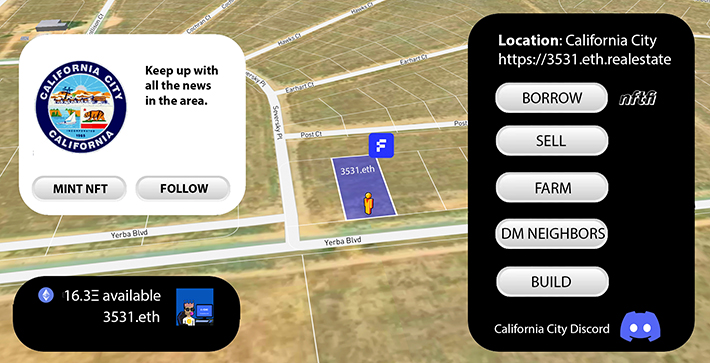
Although I’ve counted six properties in California City that are immediately identifiable as NFTs, it’s hardly the only place in the United States where this is being done. Properties available for sale as NFTs as of this writing include locations across Colorado, Arizona, New Mexico, San Bernardino-CA, and even Orange, New York. Some are very remote and speculative, while others are a part of normal civilization and priced accordingly. Buyer beware of course given the serious nature of these assets.
Perhaps one of the biggest obstacles to understanding how this is all possible is the widespread misconception of what NFTs are. Most of the American population lives under the mistaken impression that NFTs are cartoon art pictures like Bored Apes or CryptoPunks that were all the rage in 2021 and to some extent are still popular in niche circles, but almost anything can be tokenized. More recently, for example, domain names are being converted into NFTs to facilitate faster sales and quicker payouts. The same is true now here with land. Not only can land ownership change hands in the blink of an eye by transferring the NFT but one can also easily tap into the value by pledging it on a peer-to-peer NFT loan marketplace like NFTfi. Fabrica officially announced a partnership with NFTfi this past December, for example. The possibilities are endless
For the perpetual skeptics of all things blockchain that are convinced real business will only ever be done in the real world, a visualization of an NFT on a crypto wallet app might not be all that convincing, especially if the icon for it is situated right next to one of those expensive monkey pictures that kids wouldn’t shut up about years ago. The proof then is in the adventure. With a drive of less than two hours from Downtown Los Angeles, there’s a little plot of land on a quiet street known as Yerba Boulevard. It’s covered in weeds and reddish soil. Empty plains make up most of the backdrop but the suburbs are very slowly creeping their way there. In fact, I’ve since learned who my neighbor is across the street. It’s a 26,000 square foot cannabis facility that was just built in 2022. I bet the owners would be into NFTs (😂). Since that facility is up for sale, numerous 3D surrounding views exist of my plot. Turns out I can even walk to the airport. It’s not much but it’s home to me and all I could afford for the purpose of this story and learning what it was all about. Maybe those 400,000 planned residents will eventually want my land and it’ll make me a millionaire. Ah the allure of California City.
First Ever Domain Name Loan by Smart Contract Was Executed on Ethereum
January 27, 2024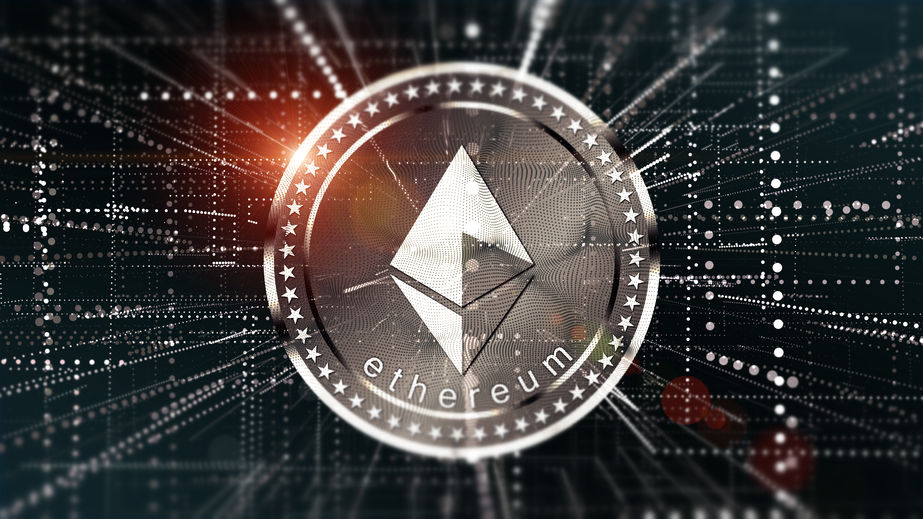 History was made on Saturday when the first ever loan against a domain name was executed with a smart contract on the Ethereum blockchain. The significance is that the success marks the birth of a new asset class that can be leveraged to unlock capital for business owners or domain name investors in an expeditious and secure manner.
History was made on Saturday when the first ever loan against a domain name was executed with a smart contract on the Ethereum blockchain. The significance is that the success marks the birth of a new asset class that can be leveraged to unlock capital for business owners or domain name investors in an expeditious and secure manner.
deBanked founder Sean Murray was the executor of the transaction. The process involved tokenizing a domain name (domainfi.net) into an NFT and then offering that NFT as collateral on an NFT loan marketplace. When a loan was executed on the platform with a smart contract, the domain name was automatically placed into an ethereum address to be held as escrow. If the borrower were to default on the loan, the smart contract would automatically release the domain name to the lender, who would now have full control of it.
The process involved two parties, the tokenizing registrar and the NFT loan marketplace. The loan, which was consummated for proof of concept, carried a 10% APY and a 7-day term. It took less than 20 minutes combined to complete the tokenization and loan execution process.
“I was guessing that this capability might still be another year away and I had not even dreamed that I would be the very first one to execute this type of loan,” said Murray. “Following this space closely probably contributed to that stroke of luck. There is still time until this is ready to be a consumer-facing product in the marketplace, but the tech already exists and transactions of this nature are already viable. It will be fascinating to watch.”
About deBanked
deBanked was launched in 2010. For questions or inquiries email info@debanked.com and call 212-220-9084.
Small Business Lending on Blockchain to be Discussed at NFT NYC
June 23, 2022Sean Murray is scheduled to speak at the NFT NYC Conference this afternoon about the use of NFTs in the small business lending market. NFT NYC is a 4-day event dedicated to the subject of non-fungible tokens. Blockchains present a possible solution to some inefficiencies that exist in the small business finance industry. Some or all of Murray’s presentation will be shared on deBanked.
Here’s a short preview of what’s going at NFT NYC:
NFT Owner’s Typo Costs $297K
December 13, 2021It seems the only thing blockchain technology can’t promise is a solution to human error.
The owner of an NFT Bored Ape Yacht Club #3547 got their decimals mixed up on Saturday when they sold the token for 0.75 eth, or 1% of its market value, by mistake. In an attempt to sell the token for 75 eth, or $300,000, the NFT was sold in error to an automated buyer in a call option-like purchase for $3,066, according to CNET.
After the purchase, the buyer dumped ten times the amount paid for the NFT into gas fees to process the transaction instantaneously, a move that prevented any chance of the error being remedied.
“How’d it happen? A lapse of concentration I guess,” the seller of Bored Ape #3547 told CNET. “I list a lot of items every day and just wasn’t paying attention properly. I instantly saw the error as my finger clicked the mouse but a bot sent a transaction with over 8 eth [$34,000] of gas fees so it was instantly sniped before I could click cancel, and just like that, $250k was gone.”
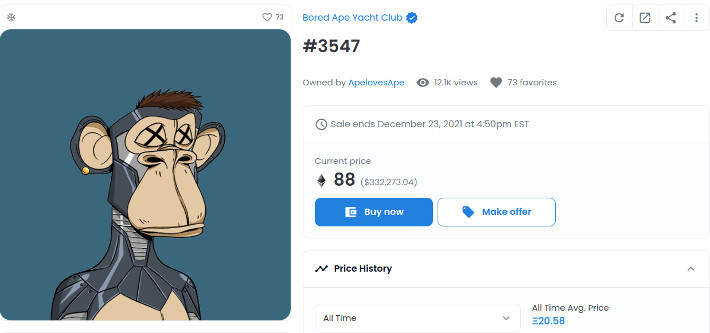
Members of the NFT legal community spoke to deBanked about how this type of stuff is all too common and unfortunate, but just comes with the territory of an unregulated financial space.
“It’s a pretty typical problem here in the Wild West,” said Jacob Martin, an attorney specializing in NFTs and author of the NFT Tax Guide. “It’s user error, not platform error. It sucks, but it is what it is.”
The Bored Ape NFT collection is one of the most sought after collections on the blockchain, with entry level tokens being worth about $200,000. While this error may have been able to be fixed in the world of traditional finance, the unforgiving nature of the blockchain world allows errors like this to be cashed in on by opportunistic purchasers.
Back in August, another Bored Ape was accidentally sold for $26,000. When the seller offered the purchaser almost double that to return the NFT, the new purchaser flipped the token to another user for $150,000.
In November, Cryptopunk #7557 which at the time was worth $19 million, was accidentally listed for $19,000. It immediately sold without remedy for the error.
When asked if regulation would help remedy errors like this in the future, some NFT legal gurus were weary about turning to government for solutions to user-committed blockchain errors.
“I don’t think it’s about regulation, it’s about education,” Shekinah Apedo, an attorney who serves as a Compliance SARs Analyst for Bittrex and NFT legal consultant to numerous companies, told deBanked. “The point of decentralization is that there’s no middleman or institution to run to when an error occurs, like one may do with a typo during a bank transaction. Education is necessary and warnings involving risk should be made known.”
“Cigarettes are legal but they are required to have warning labels,” Apedo continued. “Perhaps, regulation involving warning labels or advertising the risks of being your own bank as an NFT and crypto trader or investor would be good for the mainstream public.”
Five ‘NFT Like’ Things You May Already Own
December 9, 2021 Do you own an NFT? Believe it or not, you probably already own something very similar. Value being predicated on tangibility is a thing of the past. Below are five things you probably own or want to own that are similar to NFTs.
Do you own an NFT? Believe it or not, you probably already own something very similar. Value being predicated on tangibility is a thing of the past. Below are five things you probably own or want to own that are similar to NFTs.
1. Followers on Social Media
Are you tracking the number of people looking at your Instagram stories? Trying to either get more followers or expand your online presence? These things are online assets that are intangible, only have value in the eyes of the beholder, and cannot be exchanged for an equal asset.
2. Twitter Verification
Do you have or desire to have a blue checkmark on Twitter? This is one of the most valuable assets of the internet, and can validate your online presence. With value only given and backed by those in the community, the blue check mark is the NFT of Twitter.
3. Video Game Products
Games like Call of Duty, Fortnite, and the 2K series offer all types of digital purchases that can enhance the game experience, so much so that those that spend real money on virtual items can have a competitive advantage. These can be bought with real cash, earned through gameplay, or traded for other in-game assets. If you have the best cards or coolest clothing on your virtual character, that earns players big time legitimacy in the gaming world.
4. Area Codes
In major cities like New York, area codes have a prestigious nature about them. Don’t be caught with a 845 or 201 area code if you’re trying to look like a legitimate New Yorker.
5. iMessages
Much like digital art, some pieces are much more prestigious than others. Just like if I ask you if you’re iPhone or Android, I could ask you if you’re a Bored Ape or Cryptopunk. The blue messages that come with iMessaging are a big builder of iPhone’s value, and perception of its users, just like the value of the brands certain types of NFTs stem from. If your texts are green on IOS, many iPhone users will think differently of you. This same concept applies to the NFT sects.
Q&A with Rachel Sanders on how Small Businesses Can Utilize Blockchain Tech
December 3, 2021 At the NFT BZL conference in Miami on Tuesday, deBanked bumped into Rootine, a vitamin company that is looking to expand into the crypto space. Rootine is a small business that exists fully in the tangible world and sells a tangible product. They offer a completely customized vitamin concoction to their customers via questionnaires that identify biomarkers on their online platform.
At the NFT BZL conference in Miami on Tuesday, deBanked bumped into Rootine, a vitamin company that is looking to expand into the crypto space. Rootine is a small business that exists fully in the tangible world and sells a tangible product. They offer a completely customized vitamin concoction to their customers via questionnaires that identify biomarkers on their online platform.
This all begs the question, how do small businesses like Rootine leverage crypto? Rachel Sanders, CEO and co-founder of Rootine, shared her thoughts.
Q (Adam Zaki)- Your product is obviously inspired by tech and customer experience. Why are these fundamentals of Rootine?
A (Rachel Sanders)- We are in the middle of a health data revolution. More consumers than ever before have access to critical data about their health and this access will only grow. People should be able to leverage their data to optimize their health with precision health products and actionable insights tailored to their unique data and goals. Technology is the key to make this possible.
At Rootine, our mission is to empower members to leverage their data to achieve optimal health and fuel their potential. Rootine analyzes your body to deliver a precision daily multivitamin engineered to optimize your health, and then fine-tunes your formula over time to continuously provide optimal support for your body. Our team has worked hard to build with a human-first mentality, creating a brand that both delights our members and makes a real, and positive impact on their health. We are proud to empower thousands of members to improve their health and are excited to make an even bigger impact in 2022!”
Q-What was Rootine doing at an NFT conference?
A- As the world of web3 and NFTs ballooned in the second half of 2021, we saw a community emerging celebrating vices and fueled by alcohol. There was also this odd dichotomy occurring where health influencers were changing their profile pictures to NFTs depicting un-healthy vices. We believed that heath should be a central part of the conversation in web3, so we dove in.
Rather than build a branded NFT project, we spearheaded a collaborative effort to launch Apex Optimizers, the first NFT project exclusively focused on health and human performance optimization. Community members represent brands like Eight Sleep, Rootine, Hydrant, Span Health, Bioloop, Aloha, Gwella, OneSkin, and Bristle. Early team members from Levels and founders at Bristle, health experts like Louisa Nicole and Dr. Sohaib Imitaz, professional athletes like Justin Gatlin, as well as a number of high performers and crypto and NFT heavy hitters like Steve Aoki.
It has been difficult working in unchartered territory (as a project like this has never been done before), but we were driven by a mission to build an inclusive community highlighting the importance of data-driven health and to deliver tangible real life utility to holders. We have been fortunate to collaborate with some of the top health experts, brands, athletes, and founders in human performance while building a community that is already inspiring its members to improve in areas like sleep, stress, nutrition, fitness, mental health and more.
Q-How will NFTs enhance your product? Why do you think your customers would be more willing to buy products that have some type of blockchain component?
A– As we think about the future of the metaverse, consumer products and brands will play a large role. Exactly what that role looks like is yet to be determined. What we do know is that health will continue to matter and that consumer health brands will need to have a strategy around how they will tie their physical products and experiences into the digital world. As for Rootine, creating a trusted brand and impactful community is always top of mind. To do that, we want to be where our members are and offer unique opportunities that members will not find elsewhere.
One example of that is helping to launch Apex Optimizers. Apex Optimizers is just one of the offerings of the Precision Health Club and it is first and foremost an awesome community of like-minded data-driven health enthusiasts looking to improve how they look, feel, and perform everyday. Gaining access to that community is something Rootine can offer that others cannot, and that is valuable. Through Apex Optimizers we are also able to offer loyal Rootine members access to exclusive perks like 1:1 lessons with pro-athletes, multi-brand discounts and product drops, and real-life wellness experiences.
Q-What are you thoughts on access to capital for small businesses? Has Rootine ever found it difficult to get a loan? Do you think crypto could help the imbalance of access to funds for small businesses?
A- Access to VC capital is a challenge for many. In the VC world, only 2.2% of funding goes to female founded companies, and other minorities and underrepresented founders have similar difficulty. For others, the capital markets have been very founder-friendly recently, with companies raising VC funding at unprecedented valuations.
In the non-VC world, there are a number of new options coming to market that make it easier to get non-dilutive funding. Pipe and Clearco are two great examples. However, to get access to that funding, you have to meet specific size and business model criteria.
Crypto certainly has the ability to put more fundraising power into the hands of creators and builders. There will be more companies using crypto as a way to raise seed capital, and we are already seeing this trend. One thing to note here, is that as the barrier to enter web3 drops, there is going to be more competition for dollars, which will raise the bar on the projects and teams that will succeed in getting funding this way.
Q-Is crypto a topic of conversation in the office? I’m trying to gauge whether your staff has an interest in crypto or if this is just a pure marketing strategy.
A- We have a combination of people very into crypto (e.g. our lead product designer who was an early advocate and continues to be a key thought leader on the team) as well as crypto novices.
It has been exciting to see how the conversations on slack have created an environment of learning and support, helping more people get into the space in a way they are comfortable with. Apex Optimizers’ mission is to make an impact at scale through community, democratizing access to innovation, and by elevating the message around the importance of data-driven health.
For the brands involved, there is of course a marketing component, but at the core, we all came together to help more people live healthier lives because all brands involved support better health.
Q- The crypto space wants to move into the Metaverse. How will Rootine, a company that sells a physical product- vitamins nonetheless- pivot if the crypto community lives in a world where a desire to be healthy may decrease? (If I live in the digital world, with digital art, digital money, digital games, a remote job, and digital friends, why would I want to buy vitamins?)
A- Even if the majority of your life is spent in the digital world, you will still want to feel and perform your best on a daily basis. If people start to neglect health, their productivity decreases, their ability to be their best self at-home with their families and partners decreases, and their stress levels, fatigue and risk for chronic conditions increases. Rootine offers a convenient, at-home way to test your body and get precision multivitamins that can support better overall health, stress levels, energy, focus and more, fueling your potential.
Another interesting thing to note, is if you look at the people building the meta world, a vast majority are the same people who love to compete in athletic feats, biohack their bodies to optimize their productivity, or focus on specific diets. Because of this, health will always be a part of digital communities.
Q- What is the strategy here? Why mint an NFT? Is it to expose the brand? Attract investors? Corner a niche market? Who thought of this, and what’s the end goal?
A-Apex Optimizers’ mission is to make an impact at scale through community, democratizing access to innovation, and by elevating the message around the importance of data-driven health. IJ on the Rootine team originally came up with an idea to explore NFTs and the project has been a collaboration ever since. All people involved have helped shape the design, launch, community and the 30+ perks (and growing) that holders will gain access too.
Q- What is the best way for a small business, regardless of industry, to educate themselves and leverage the crypto market?
A- Get started. If you don’t own an NFT, buy one. Follow web3 twitter and join some discord servers. Research what other brands in your space or adjacent spaces are doing. If specifically looking at NFTs, find whitespace where you can build a unique project that is both collaborative and on-brand
Tech Creators, Artists, and Tomorrow’s Entrepreneurs Flock to Miami for NFT BZL
December 1, 2021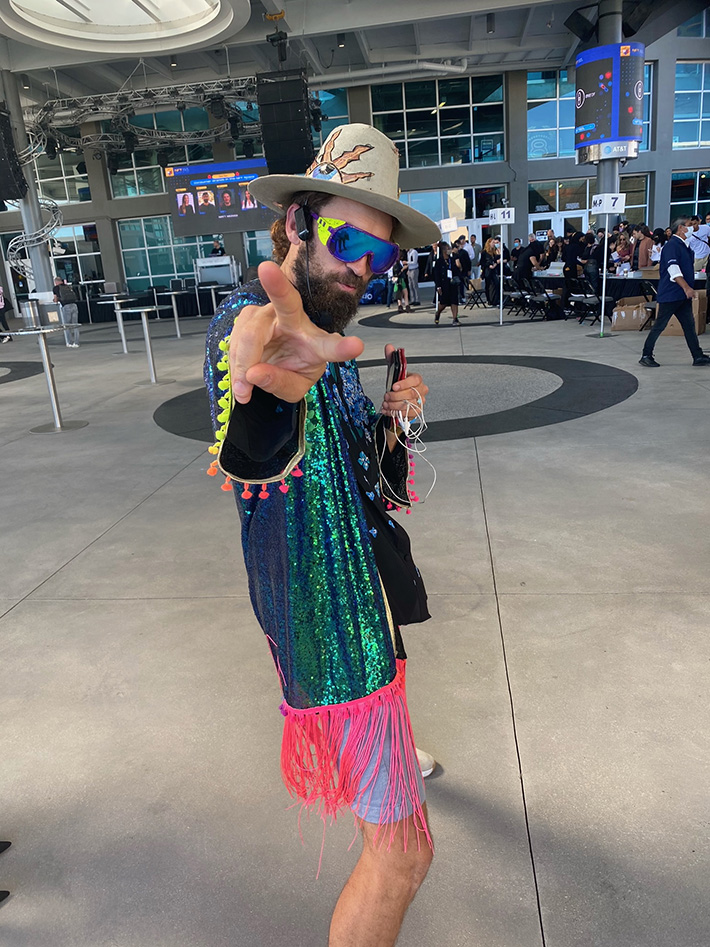 An attendee poses outside of NFT BZL in Miami
An attendee poses outside of NFT BZL in MiamiWhether they’re the future billionaires building the new digital world, or young people with big ideas and crypto-induced riches, money-hungry twenty-somethings showed up in droves to the FTX Arena on Tuesday for what some called the biggest NFT event to ever take place in Miami.
“NFT’s are almost like a hyper version of insurance for authenticity,” said Casey Craig, Global Head of Communications at CoinDesk and speaker during the ‘Culture Converges with Blockchain and Fashion’ panel. Craig spoke about her personal thoughts on the value NFTs provide to everyone involved in NFT buying and selling processes.
“When you think of NFTs and how you authenticate something, and how they’re preserving that rarity, it’s such a game changer,” Craig said. “I think it’s super practical. I think we need this authentication and creativity. I think it will enable not only the creators, but the people that are purchasing these NFTs.”
Other attendees were focused on using the flamboyant nature of the NFT space to sell their projects to those attendees whose goal was to find their next big tokenized investment. An artist who goes by Oona was at the event to promote her NFT project, strutting around in an outfit that covered her in real cash from head to toe.
“I make video art, and for a long time galleries didn’t quite know how to add value to
or create a unified system of value,” said Oona. “I think a lot of artists like myself are coming to the NFT space because it’s finding a way [for artists] to not give up on their dreams yet, you can actually survive and make a living from art, and connect with others through it.”
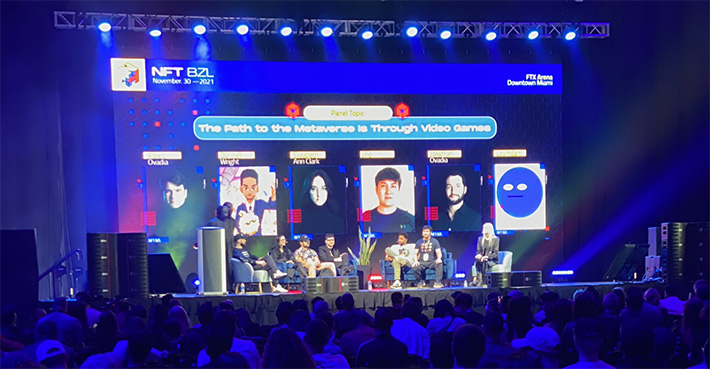 Oona spoke on the art community’s history of attaching themselves to great innovations, and how blockchain technology is just another example of creators utilizing new ways to showcase their work. “NFTs are going to become a normal part of our lives and as per usual, artists have found it first.”
Oona spoke on the art community’s history of attaching themselves to great innovations, and how blockchain technology is just another example of creators utilizing new ways to showcase their work. “NFTs are going to become a normal part of our lives and as per usual, artists have found it first.”
Other individuals in attendance were critical of the media’s take on NFTs, and how the press has built an outside perception of NFTs being of over-the-top art that has little tangible value. Raymond Chen, Community Manager of Nansen, a blockchain data management software tool, spoke on the media’s apparent naive perception of blockchain tech and how real world usage of the technology is more relatable to everyday people than most would think.
“The media’s perception of NFTs is some [nonsense] art that is worth like a hundred thousand dollars, it’s so insane. It’s not just some JPEG on the internet, there is real utility value behind it.”
Chen spoke extensively about the value blockchain tech has for everyday consumers. “If you NFT your house, you can bypass a selling agent, buyer agent, and just cut out the middleman for these things,” Chen said.
“If you NFT your car, you can cut out the middle men when you want to sell your car when it’s used. You’re going to get low balled at a dealership, they’re going to up-charge it, and sell it to someone else for more. If you sell peer-to-peer, you cut out all the middle men, and all this slippage and transaction fees in the middle.”
Those in the fintech-esque field are also taking an interest in the NFT space, like Adam Hanna of Circle Internet Financial; who was there representing a software that allows instant payouts of crypto to dollars, or vice versa, for businesses who wish to accept crypto style payments. Hanna spoke about the next great innovation in crypto, and how whoever can figure that out is in store to cash in at an astronomical level.
“I wish I knew,” said Hanna, when asked what that next big idea is. “The NFT space as a whole is something that is still so young, really, like it’s in the past couple of months that it really took off, it hasn’t even been a full year at this point. So it’s just seeing how it’s constantly evolving, what those next projects are, and how different companies are using their own platform, or other platforms, to really promote NFTs in a different way, that’s where it’s at.”
Notable attendees that deBanked bumped into included Miami Mayor Francis Suarez, child actor turned crypto-tycoon Brock Pierce, rapper Kosha Dillz, and UFC fighter Ali AlQaisi. Members of the Miami Dolphins and Los Angeles Sparks were also in attendance, signing NFT-inspired autographs.
Whether you buy into the hype or think it’s equally as ridiculous, the NFT community will continue to be the loudest, most animated, and exuberant group in the world of modern finance.
ConstitutionDAO NFTs
November 20, 2021If NFTs can be used to capture a moment or experience, then there should be some already available to showcase the current state of the movement. Here are some that we have found:



















